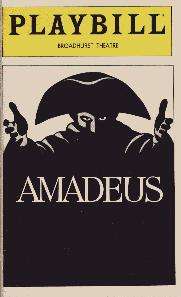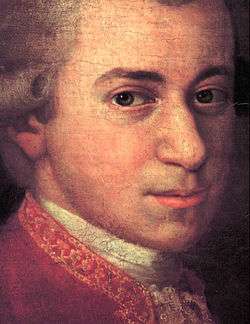Amadeus
| Amadeus | |
|---|---|
 Playbill, 1981 | |
| Written by | Peter Shaffer |
| Characters |
Wolfgang Amadeus Mozart Antonio Salieri Constanze Weber Katherina Cavalieri Emperor Joseph II Count Orsini-Rosenberg Baron Gottfried van Swieten Giuseppe Bonno Count Johann Kilian von Strack Priest Teresa Salieri Venticelli Vienna Citizens |
| Date premiered | 2 November 1979 |
| Place premiered |
National Theatre London, England |
| Original language | English |
| Subject | Biography of Wolfgang Amadeus Mozart |
| Genre | Drama, tragedy |
| Setting | 1783–1825; Vienna, Austria; the Court of Joseph II |
Amadeus is a play by Peter Shaffer, which gives a highly fictionalized account of the lives of the composers Wolfgang Amadeus Mozart and Antonio Salieri. First performed in 1979, Amadeus was inspired by a short 1830 play by Alexander Pushkin called Mozart and Salieri (which was also used as the libretto for an opera of the same name by Nikolai Rimsky-Korsakov in 1897).
In the play, significant use is made of the music of Mozart, Salieri and other composers of the period. The premieres of Mozart's operas The Abduction from the Seraglio, The Marriage of Figaro, Don Giovanni, and The Magic Flute are each the setting for key scenes of the play.
After being presented at the Royal National Theatre, London in 1979, the success of the play saw it move to the West End followed by Broadway. Amadeus won the 1981 Tony Award for Best Play. It was adapted by Shaffer for the 1984 Academy Award-winning film of the same name.
Plot
Since the original run, Shaffer has extensively revised his play, including changes to plot details; the following is common to all revisions.
At the opening of the tale, Salieri is an old man, having long outlived his fame. Speaking directly to the audience, he claims to have used poison to assassinate Mozart, and promises to explain himself. The action then flashes back to the eighteenth century, at a time when Salieri has not met Mozart in person, but has heard of him and his music. He adores Mozart's compositions, and is thrilled at the chance to meet Mozart in person, during a salon at which some of Mozart's compositions will be played. When he finally does catch sight of Mozart, however, he is deeply disappointed to find that Mozart himself lacks the grace and charm of his compositions: When Salieri first meets him, Mozart is crawling around on his hands and knees, engaging in profane talk with his future bride Constanze Weber.
Salieri cannot reconcile Mozart's boorish behaviour with the genius that God has inexplicably bestowed upon him. Indeed, Salieri, who has been a devout Catholic all his life, cannot believe that God would choose Mozart over him for such a gift. Salieri renounces God and vows to do everything in his power to destroy Mozart as a way of getting back at his Creator.
Throughout much of the rest of the play, Salieri masquerades as Mozart's ally to his face while doing his utmost to destroy his reputation and any success his compositions may have. On more than one occasion it is only the direct intervention of the Emperor himself that allows Mozart to continue (interventions which Salieri opposes, and then is all too happy to take credit for when Mozart assumes it was he who intervened). Salieri also humiliates Mozart's wife when she comes to Salieri for aid, and smears Mozart's character with the Emperor and the court. A major theme in Amadeus is Mozart's repeated attempts to win over the aristocratic "public" with increasingly brilliant compositions, which are always frustrated either by Salieri or by the aristocracy's own inability to appreciate Mozart's genius.
The play ends with Salieri attempting suicide with a razor in a last attempt to be remembered, leaving a confession of having murdered Mozart with arsenic. He survives, however, and his confession is met with disbelief, leaving him to wallow once again in mediocrity.
Background and production
Historical accuracy
Shaffer used artistic license in his portrayals of both Mozart and Salieri. Documentary evidence suggests that there was some antipathy between the two men, but the idea that Salieri was the instigator of Mozart's demise is not taken seriously by scholars of the men's lives and careers. While historically there may have been actual rivalry and tension between Mozart and Salieri, there is also evidence that they enjoyed a relationship marked by mutual respect.[1] As an example, Salieri later tutored Mozart's son Franz in music. He also conducted some of Mozart's works, both in Mozart's lifetime and afterwards.[2]
Writer David Cairns called Amadeus "myth-mongering" and argued against Shaffer's portrait of Mozart as "two contradictory beings, sublime artist and fool", positing instead that Mozart was "fundamentally well-integrated". Cairns also rejects the "romantic legend" that Mozart always wrote out perfect manuscripts of works already completely composed in his head, citing major and prolonged revisions to several manuscripts (see: Mozart's compositional method).
Notable productions
Amadeus was first presented at the Royal National Theatre, London in 1979, directed by Sir Peter Hall and starring Paul Scofield as Salieri, Simon Callow as Mozart, and Felicity Kendal as Constanze. (Callow later appeared in the film version in a different role.) It was later transferred in modified form to the West End, starring Frank Finlay as Salieri.[3] The cast also included Andrew Cruickshank (Rosenberg), Basil Henson (von Strack), Philip Locke (Greybig), John Normington (Joseph II) and Nicholas Selby (van Swieten).[4]
The play premiered on Broadway in 1980 with Ian McKellen as Salieri, Tim Curry as Mozart, and Jane Seymour as Constanze. It ran for 1,181 performances and was nominated for seven Tony Awards (Best Actor for both McKellen and Curry, Best Director for Peter Hall, Best Play, Best Costume Design, Lighting, and Set Design for John Bury), of which it won five (including Best Play and Best Actor for McKellen). In 2015, Curry stated in an interview that the original Broadway production was his favorite stage production that he had ever been in.[5] During the run of the play McKellen was replaced by John Wood, Frank Langella, David Dukes, David Birney, John Horton, and Daniel Davis. Curry was replaced by Peter Firth, Peter Crook, Dennis Boutsikaris, John Pankow, Mark Hamill,[6] and John Thomas Waite. Also playing Constanze were Amy Irving, Suzanne Lederer, Michele Farr, Caris Corfman and Maureen Moore.
Adam Redfield (as Mozart) and Terry Finn (as Constanze) appeared in the 1984 Virginia Stage Company production, at the Wells Theatre in Norfolk, directed by Charles Towers.
The play was revived in 1999 at the Music Box Theatre, New York City, directed again by Peter Hall and ran for 173 performances (15 December 1999 until 14 May 2000), receiving Tony Award nominations for Best Revival and Best Actor in a Play (David Suchet, who played Salieri). Also in the cast were Michael Sheen as Mozart, Cindy Katz as Constanze and David McCallum as Joseph II.
In July 2006, the Los Angeles Philharmonic presented a production of portions from the latest revision of the play at the Hollywood Bowl. Neil Patrick Harris starred as Mozart, Kimberly Williams-Paisley as Constanze Mozart, and Michael York as Salieri. Leonard Slatkin conducted the Philharmonic Orchestra.[7]
Rupert Everett played Salieri in a production at the newly refurbished Chichester Festival Theatre from 12 July through 2 August 2014. The cast included Joshua McGuire as Mozart, Jessie Buckley as Constanze and John Standing as Count Orsini-Rosenberg. Simon Jones played Joseph II. Peter Shaffer attended the play at the closing performance.
Film and other adaptations
The 1984 film adaptation won an Academy Award for Best Picture. In total, the film won eight Academy Awards. It starred F. Murray Abraham as Salieri (winning the Oscar for Best Actor for his performance), Tom Hulce as Mozart, and Elizabeth Berridge as Constanze. The play was thoroughly reworked by Shaffer and the film's director, Miloš Forman with scenes and characters not found in the play.[8] While the focus of the play is primarily on Salieri, the film goes further into developing the characters of both composers.
In 1983, BBC Radio 3 aired the play directed by Sir Peter Hall and starring the original cast of his National Theatre production. The cast included:
- Paul Scofield as Antonio Salieri
- Simon Callow as Wolfgang Amadeus Mozart
- Felicity Kendal as Constanze Mozart
- John Normington as Joseph II
- Nicholas Selby as Gottfried van Swieten
- Willoughby Goddard as Count Franz Orsini Rosenberg
- Basil Henson as Johann Killian Von Strack
- Donald Gee, Dermot Crowley as Venticelli
- Nigel Bellairs, Susan Gilmore, Peggy Marshall, Robin Meredith, Anne Sedgwick, William Sleigh, Glenn Williams as Citizens of Vienna
This radio production was re-broadcast on 2 January 2011 as part of Radio 3's Genius of Mozart season.[9]
To celebrate Mozart's 250th birthday in 2006, BBC Radio 2 broadcast an adaptation by Neville Teller of Shaffer's play in eight fifteen-minute episodes directed by Peter Leslie Wilde and narrated by F. Murray Abraham as Salieri[10] (re-broadcast 24 May – 2 June 2010 on BBC Radio 7).
Awards and nominations
- 1979 Evening Standard Award for Best Play[11]
- 1981 Drama Desk Award for Outstanding New Play[12]
- 1981 Tony Award for Best Play[12]
See also
References
- ↑ Brown, A. Peter (7 February 2009). "Amadeus and Mozart: Setting the Record Straight". The American Scholar. 61 (1).
- ↑ Hildesheimer, Wolfgang: Mozart, 1977
- ↑ Josephdreams (2 July 1981). "Frank Finlay". Frank Finlay. Retrieved 19 September 2011.
- ↑ Hall, P, Goodwin J. The Peter Hall Diaries: The Story of a Dramatic Battle. Hamish Hamilton, London, 1983, p. 461, footnote 1.
- ↑ Ian McKellen (2008). "Amadeus". Ian McKellen Stage. Archived from the original on 28 May 2008. Retrieved 26 June 2008.
- ↑ Thomas, Bob. "Hamill changes pace as star of 'Amadeus'" Pittsburgh Post-Gazette, 20 July 1983
- ↑ "Neil Patrick Harris Is Mozart in Hollywood Bowl's Amadeus Live". Playbill.com. Retrieved 19 September 2011.
- ↑ Malgorzata Kurowska (1998). "Peter Shaffer's play 'Amadeus' and its film adaptation by Milos Forman". Retrieved 26 June 2008.
- ↑ Drama on 3 (2011). "Amadeus". BBC Radio 3. Retrieved 2 January 2011.
- ↑ Radio 2 Readings (2006). "Amadeus". BBC Radio 2. Retrieved 26 June 2008.
- ↑ "Shaffer: Acclaimed Amadeus playwright". BBC Online. 30 December 2000. Retrieved 1 May 2011.
- 1 2 IBDB. "Production Awards". Retrieved 1 May 2011.
External links
- Amadeus at the Internet Broadway Database
- Amadeus at the Internet Broadway Database
- Amadeus character descriptions from StageAgent.com
